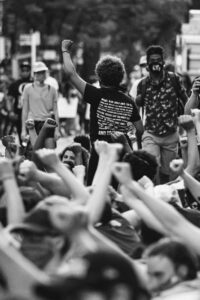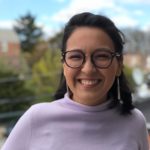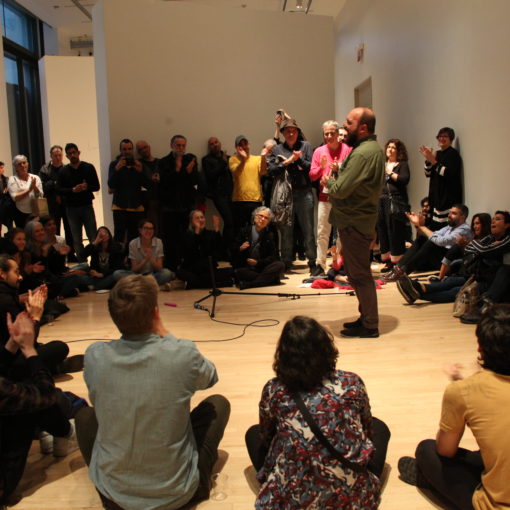
Those who are familiar with archival work might relate to the experience of the archive as an almost sacred place, a noiseless repository of the past, the incarnation of hegemonic history, accessible to a select few… and cold, very cold… In contrast, activist archiving offers the possibility to turn archival work into energeia –– a practice that attempts to make historical knowledge more accessible and participatory, inclusive of Other voices and experiences, and most importantly, a key ingredient in performing socially responsive pedagogies that incorporate students’ experiences while fostering their agency in enacting their own voices and histories. Activist archiving promotes equity both inside and outside the classroom and offers a concrete methodology for performing pedagogies with a social justice approach.
I first learned about the notion of activist archiving while reading about critical, participatory action research and by attending Dr. Brian Jones’s workshop in March 2021 on “Activism, Archives and Education,” organized by the PublicsLab. Brian is an alum of the Urban Education department at The Graduate Center, as well as a New York City school teacher, actor, scholar and activist. Currently, he’s the Associate Director of Education at the Schomburg Center for Research in Black Culture. In his workshop, Brian offered an overview of his public-facing research, highlighting multiple ongoing projects attempting to bridge (counter) archives with educators, students, and activists to make history more public, accessible and relevant to these people as well as to broader audiences.
The first question raised at the beginning of Brian’s workshop was “What is activist archiving?” After participating in the workshop, I must recognize that I still cannot exactly say what activist archiving is, though I am able to discuss what it does. In this brief post, I will try to persuade you that activist archiving is an opportunity to reflect on the archive as action and as practice, rather than as space or repository. Activist archiving is a call for scholars and educators using archival materials to interrogate not just its contents but also the structures of power that make archives possible: Who constructs archives? How are archives constructed? Whose histories are included, and whose are excluded from the archive? Activist archiving is an opportunity to make counter / alternative / bottom-up archives public while challenging hegemonic narratives. In doing so, this practice transforms the archive into a site for social justice, making its contents relevant to people’s lives and fostering critical knowledge about the foundational inequities constructing the present. By bridging archives, educators and students particularly, activist archiving allows people to engage in the historical production of knowledge, to integrate history into their own lives, and to understand their own social experience through the archive.
But how to do activist archiving in the classroom? And particularly, how can activist archiving be a concrete practice to perform socially responsive pedagogies that incorporate students’ experiences and promote their purposeful engagement with the world? In his workshop, Brian showcased the project Voices of a People’s History of the United States (2016-present), which he recognized as the most developed and long standing of the four presented in the session, and which powerfully combines archives, activism and education. Brian’s project takes the primary sources that informed Howard Zinn’s A People’s History of the United States, such as letters, speeches, songs and poems by radical, marginalized subjects of US history (slaves, indigenous people, workers on strike and women), and has students from the Maxine Greene High School for Imaginative Inquiry perform the pieces. The main goal is for them to fully engage with the material: to cast themselves into roles, delve into and learn the content, and finally perform in a public space like the Lincoln Center Atrium. Educators work hand in hand with students, curating excerpts and teaching acting. Students give expression to voices they feel connected to and, in doing so, find their own voice, understand that history matters, and cultivate awareness about who they are and what they want to fight for.
In a similar vein, The Schomburg Curriculum Project (2019-2022), funded by The Institute of Museum and Library Services, promotes the use of Schomburg archives in the classroom, making these resources available to students as well as to teachers. Following recent conversations in the field, the project is developing interventions that supplement the grades 6-12 curriculum and push discussions in radical new directions. By connecting archival resources, high school curriculum, and academic scholarship, these curricular interventions make academic conversations legible to students and promote the analysis of primary sources related to topics such as slavery, Black women’s stories, and Black power, which are only superficially covered in traditional middle and high school curricula.
In looking at these initiatives that perform activist archiving and attempt to intervene in the curriculum, I discovered many similarities with a project I am currently leading, titled Teaching and Learning Spanish at CUNY: Public Language Education through Archival Resources. Funded by The Center for The Humanities at The Graduate Center, my project advocates for the use of archival materials as open educational resources in the Spanish-language classroom. The goal is to center the Latinx experience and history in Spanish language education in order to develop students’ critical knowledge about the historical nature of current social struggles related to speaking Spanish in the US.
Teaching and Learning Spanish at CUNY partners with CUNY archival institutions such as the Center for Puerto Rican Studies, the Dominican Studies Institute and the Mexican Studies Institute, and supports these institutions by promoting their collections and activist work in the classroom. CUNY-based activist archives become an instrument for challenging misrepresentations of the role of Latinx communities in US history and society. At the same time, they create an opportunity for Spanish teachers to interrogate the curricular structures that place heavy emphasis on mastery of grammatical rules rather than on meaningful social content responsive to students’ experiences. Students exploring these resources develop critical knowledge about the historical nature of their own experiences and struggles in the US and, most importantly, voice their experiences and positionalities though the archive, becoming themselves producers of knowledge that complement radical archives in the classroom.
Instead of thinking of the archive as a sacred repository, I propose instead thinking of activist archiving as energeia, action, a practice that scholars can perform in educational settings for social justice purposes. Brian’s projects and mine share two common concerns: first, how archives might contribute to curricular structures that are more connected to students’ worlds and experiences; second, to what extent archives can be empowering resources that allow students to voice their own histories and affirm their place in the world and teachers to perform culturally and socially responsive pedagogies. In this way, the archive can become an effervescent site infused with dynamic energy, and educators can use archives to infuse their classrooms with activist knowledge and intervene in the making of the present by bringing people together to incite change.
 Tania Avilés Vergara is a PhD candidate in the Program of Latin American, Iberian, and Latino Cultures. She earned her MA in Hispanic Linguistics at University of Chile and she is a member of the Grupo de Glotopolítica at CUNY. Her research focuses on literacy practices among the lower ranks of Chilean society at the turn of the 20th century, and her dissertation explores familial letter-writing during Chile’s nation-building process. She worked in Archivo Central Andrés Bello (University of Chile), and she has participated in several cultural projects funded by Consejo Nacional de la Cultura y las Artes (Chile). She has taught Spanish for heritage students and Hispanic Linguistics in CUNY. In both courses, she pursues critical awareness among the students while linking language structures and use to processes of identity construction and social discrimination. Currently, she explores archives as open educational resources within the CUNY classroom to rethink hegemonic narratives of social inequality.
Tania Avilés Vergara is a PhD candidate in the Program of Latin American, Iberian, and Latino Cultures. She earned her MA in Hispanic Linguistics at University of Chile and she is a member of the Grupo de Glotopolítica at CUNY. Her research focuses on literacy practices among the lower ranks of Chilean society at the turn of the 20th century, and her dissertation explores familial letter-writing during Chile’s nation-building process. She worked in Archivo Central Andrés Bello (University of Chile), and she has participated in several cultural projects funded by Consejo Nacional de la Cultura y las Artes (Chile). She has taught Spanish for heritage students and Hispanic Linguistics in CUNY. In both courses, she pursues critical awareness among the students while linking language structures and use to processes of identity construction and social discrimination. Currently, she explores archives as open educational resources within the CUNY classroom to rethink hegemonic narratives of social inequality.







